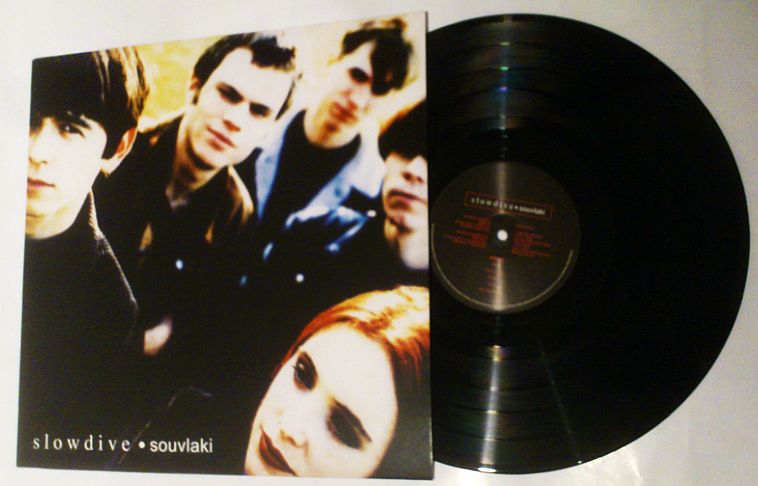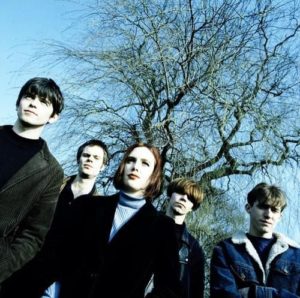
Souvlaki (1993): When Slowdive Touched the Sky
During the exciting first years of the 90s decade, the USA were experiencing the angry and furious fever of grunge bands like Nirvana, Pearl Jam, and Soundgarden. On the other side of the Atlantic ocean, an underground musical genre with a radically opposite sound had been fascinating England for some years: it was a mysterious, beautiful and fascinating noise, commonly known as shoegaze. In 1991, the mythical British label Creation Records released one of the most influential records of all time, My Bloody Valentine’s second album Loveless. This groundbreaking release ended up defining the shoegaze movement: a form of lethargic rock, stylistically influenced by the noise and stridency of bands like The Jesus and Mary Chain, and by the dream pop trend of bands like Cocteau Twins and Mazzy Star. Guitars loaded with distortion, reverb and constant use of pedals- the result was a thick and sweet wall of noise.
 The music press of those times, especially NME and Melody Maker, labeled the nascent genre as shoegaze. The name came from bands cradled in Creation Records (Ride, Sverwedriver, The Telescopes, The Boo Radleys, among others) which used to stare down at the pedals during their concerts. In 1993, another band from the same company named Slowdive (led by Neil Halstead and Rachel Goswell), returned from a North American tour after releasing Just For a Day (1991), their first LP. Slowdive were getting ready to return to the studio and focus on what would be their next album, Souvlaki (1993). They had absolutely no idea that this record would become another great bastion of shoegaze and one of the greatest and most influential albums of the entire decade. In compositional terms, Souvlaki represents a great step forward from its predecessor. Neil Halstead creates compositions in which he tries not to overwhelm the listener with walls of guitars, but to give each song a seductive and mysterious texture. All of this supported by the immeasurable whispering voice of Rachel Goswell, and also by a sublime cacophony of guitar experimentation. The legendary musician Brian Eno is another one of the key names for the plate: initially requested by the band to produce the album, he ended up writing the song “Sing” with Halstead, and also decorating the impressive “Here She Comes” with his usual ambient touches.
The music press of those times, especially NME and Melody Maker, labeled the nascent genre as shoegaze. The name came from bands cradled in Creation Records (Ride, Sverwedriver, The Telescopes, The Boo Radleys, among others) which used to stare down at the pedals during their concerts. In 1993, another band from the same company named Slowdive (led by Neil Halstead and Rachel Goswell), returned from a North American tour after releasing Just For a Day (1991), their first LP. Slowdive were getting ready to return to the studio and focus on what would be their next album, Souvlaki (1993). They had absolutely no idea that this record would become another great bastion of shoegaze and one of the greatest and most influential albums of the entire decade. In compositional terms, Souvlaki represents a great step forward from its predecessor. Neil Halstead creates compositions in which he tries not to overwhelm the listener with walls of guitars, but to give each song a seductive and mysterious texture. All of this supported by the immeasurable whispering voice of Rachel Goswell, and also by a sublime cacophony of guitar experimentation. The legendary musician Brian Eno is another one of the key names for the plate: initially requested by the band to produce the album, he ended up writing the song “Sing” with Halstead, and also decorating the impressive “Here She Comes” with his usual ambient touches.
“Alison” is the opening track of Souvlaki, the one that marks the launch of our journey into the ethereal universe. The harmonies of Goswell and Halstead are masterfully conjugated together, achieving the blissful sensation of levitation. But it is when “Machine Gun” arrives that our bodies can no longer contain us. The vocal alternation between Goswell and Halstead is guided by guitars that open our souls, immediately injecting us with a spectacular feeling of bliss. The vitality and beauty that emanate from these songs is a reflection of the ambition that Slowdive intended with their art. The song “40 Days” closes this phenomenal beginning, completely capturing the attention of the listener. The themes with Eno represent a low but essential decrease of revolutions: “Sing” and “Here She Comes” serve as the ideal foreplay for the climax, and give way to one of the most amazing tracks on the album, “Souvlaki Space Station”–filled with delays that warm up engines, and then take off to infinity. The speeds increase again with the unparalleled “When The Sun Hits”, which displays the sonic spectacularism of an otherworldly experience.Towards the end, the songs “Altogether” and “Melon Yellow” serve as a soundtrack that returns us to Earth, with a delicate sense of infinity. The acoustic closure of the album comes with the heartbreaking “Dagger”, a song that has shed tears over the world – in its lyrics, Halstead talks about his romantic break-up with Goswell. Souvlaki‘s overwhelming success in terms of musical impact was criminally ignored in its first years of release, the band was disintegrating and the promotional tours were a total disaster. Their label, critics and the public would incline in favor of the American grunge and the new star of britpop: Oasis.
Time has placed this album in a very special and well-deserved spot. Souvlaki is one of those rare records that left its indelible mark among all of us who seek in music a refuge where we can protect ourselves from the constant blows of life: a vehicle that transport us to a heavenly space, where we can always feel in glory.
by Octavio Carbajal González

Great review, Octavio. This is definitely one of the best albums of that era. And hasn’t dated a bit over the years. Another band from that era that needs mentioning is Bowery Electric. They were actually from New York as the name suggests. Their self tiled album and follow up album Beat are right up there in shoegaze’s best releases.
Thanks for reading, Serge. Glad you liked it !
Bowery Electric is a great band, they don’t get mentioned very often. In my opinion, “Beat” is more attached to post-rock and ambient pop. But, it also has very interesting shoegaze elements. I’ll dig deeper into their discography…
Very relaxing songs. Are there any similar albums like this one??
I think that nothing compares to this one, but I would definitely recommend Soda Stereo’s “Dynamo”, Cocteau Twins’ “Heaven or Las Vegas” and The Verve’s “A Storm in Heaven”
Alfred,
I recommend Ride – Nowhere, Slowdive’s debut Just for a Day, Spiritualized – Lazer Guided Melodies, Verve – Storm in Heaven, Bark Psychosis – Hex, Mazzy Star – So Tonight That I Might See & Among My Swan. (I also recommend Beach House’s albums Bloom, Depression Cherry, Thank Your Lucky Stars.)
Grateful for the recommendations, guys !!!
Alison is one of the best songs of all time. This album is so much better than loveless because u can hear the vocals and it doesn’t feel like one long noise compilation. Niece piece
Agree, Alison is such a great opener. I think that Loveless also has a very unique sound, but it’s more challenging. Thanks !
Martin,
Agreed about Loveless (not a fan). Much prefer Nowhere (Ride), Just for a Day (Slowdive), Lazer Guided Melodies (Spiritualized), Storm in Heaven (Verve).
It’s amazing how you start commenting on record creation and the start with My bloody valentine. But, souvlaki has been a great starter is the sensation of shoegaze and dream pop. it was great.
Glad you dig the article, I also wanted to give a little background about shoegaze/dream pop. So many great albums inside this genre, but nothing like Souvlaki.
You also write very good music reviews. Souvlaki is one of my essentials..
Thanks Adriana. I don’t write about music very often, but this album definitely deserved an article !
Slowdive means atmosphere and to let go… Close your eyes and dream, very beautiful.
Beautiful record 💜
Agree with you (Mike, Sara). Song after song of pure emotion, warm vibrations and liquid beauty.
Octavio,
Excellent article about one of my favorite albums of the 1990s. I appreciate how you highlighted Neil Halstead’s harmonies with Rachel Goswell, the guitar soundscapes, and the lyrical context surrounding the sessions. I also appreciate your guiding of the listener/reader through the sequence of the songs–the Brian Eno tracks are a meditative interlude before the cinematic, cosmic climax of “Souvlaki Space Station” and “When the Sun Hits” (two of the band’s best songs) and then the following three tracks are, as you said, a return to reality.
Thanks for the positive feedback, Mark. I know that Slowdive is a very special band for you…
My first approach to them came with the soundtrack of Gregg Araki’s cult-coming of age film “Mysterious Skin”. When I first heard the phenomenal and unbelievable beauty of Slowdive’s song “Catch The Breeze”, my brain was hooked.
I know that Souvlaki is often associated with MBV’s “Loveless” and Ride’s “Nowhere” (the holy trinity of Shoegaze). However, I think that this album stands on it’s own… such a special sound that can’t be replicated. My favorite tracks are “When The Sun Hits” and “Sing”.
Hi Octavio, great review! Although I have to admit that I have never listened to this album since I’m not that much into dream pop. You’re right, most shoegaze bands never made it into the mainstream, just as most alternative psych/garage etc bands never become mainstream (except for JAMC which I just saw in Cologne in a packed, sold-out venue) . The very, very diverse bands gathered under the terms grunge and britpop definetely dominated the 90s, although one shouldn’t blame all on bad, corporate taste (Oasis) – bands like Suede, Pulp and some grunge acts were quite sophisticated with their music and lyrics, and the energy they provided, and the zeitgeist that they hit with their lyrics. Dream pop for me is like death-metal in a way: a perpetual state of always the same that fails to cover a wider or more complex range of moods. So I tend to attribute the lack of success of dreampop to its fetish character, very repetitive in musical and lyrical motives, while at the same time being very closed and not open for interpretation. Just a thought.
That being said, I’ll listen to this album soon because of the great Brian Eno. Excited!
Hey Saliha, Shoegaze and dream pop are two of the most important and influential genres in my life, this album is a perfect fusion of both (the distinct sound of MBV and flashes of Cocteau Twins).
I understand why many people are initially turned off by these genres, they aren’t for the impatient, and sometimes they tend to get quite abrasive, repetitive and suffocating. However, I obtain a certain sense of strange melancholy and peace with these sounds, especially with Souvlaki. I know that Slowdive are much beloved in the alternative circles for all their albums, and for good reasons. But, I think that the band struck gold with Souvlaki and never really got close again. The reverb combines perfectly with fuzz and ethereal vocal harmonies, Brian Eno delivers his distinct mark of perfection.
JAMC influence also appears subtly in this record, great that you saw them live !. Ialso agree that not all grunge and britpop acts were bad, I’m a fan of Nirvana and I certainly appreciate what Blur, Pulp and Suede were doing in those times. I wish that I could listen to Souvlaki for the first time again, enjoy !